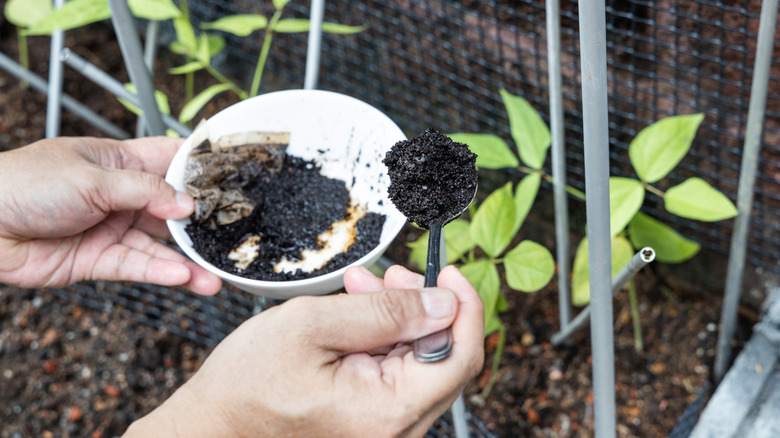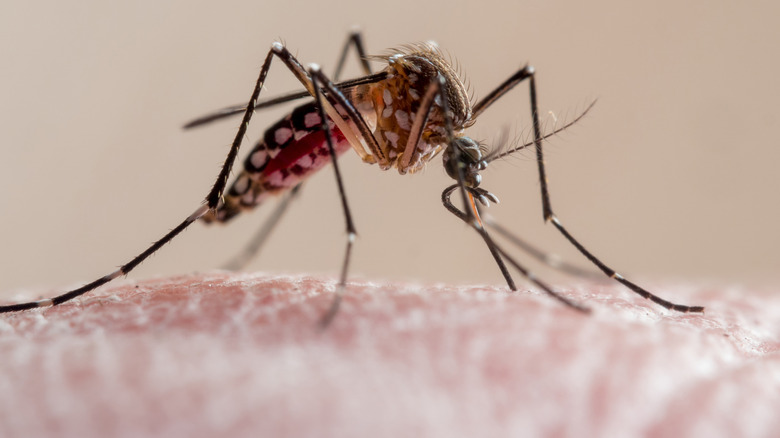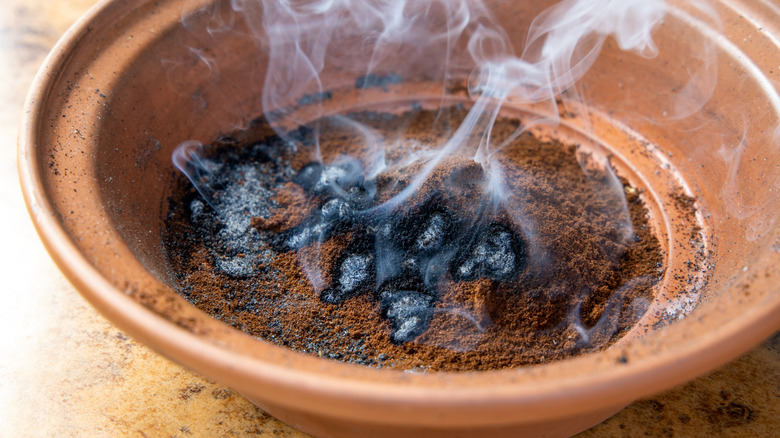Can Coffee Grounds Deter Mosquitoes? The Truth Behind The Trend
Mosquitoes are easily among the most annoying insects, not just because they bite multiple times and leave behind itchy red welts, but because those bites can transmit serious diseases like West Nile, dengue, and Zika virus. So when hacks surface suggesting they can be used to repel mosquitoes using natural methods, it's tempting to give them a try. One such trend claims that used coffee grounds can act as a mosquito deterrent, and many are eager to see if it actually works. But before you start tossing out the grounds used to brew your morning cup of Joe, you might want to know if there's any scientific evidence to back it up. So, is there?
In short, no. There's currently no scientific evidence that shows used coffee grounds can completely deter mosquitoes, even when sprinkled in standing water. But don't lose hope just yet. While spent coffee grounds won't exactly drive all the mosquitoes out of your yard, it can help reduce their numbers by disrupting their breeding in standing water where mosquitoes typically lay their eggs. And fewer larvae means fewer mosquitoes flying around. In this case, getting rid of some is definitely better than none.
How coffee grounds can reduce mosquito reproduction in your yard
While there's no clear-cut way to eliminate mosquitoes entirely from your yard, used coffee grounds may help disrupt their reproduction, ultimately reducing their population. The idea is to target mosquito larvae (the stage where they have already hatched but are still living in water) by sprinkling used coffee grounds into standing water around your home, such as puddles or other shaded areas where it tends to collect. According to a study published in the International Journal of Mosquito Research that tested this method on Aedes aegypti larvae, a common mosquito species found in the U.S., spent coffee grounds, when sprinkled in water, release secondary metabolites like alkaloids and flavonoids that are toxic to mosquito larvae and strong enough to kill some.
The study also showed that the higher the concentration of coffee grounds, the greater the larvae mortality rate. When 34 grams of coffee grounds were mixed with a liter of water, 23 out of 30 larvae died, resulting in a 76.67% mortality rate. With just 33 grams, only 14 died, dropping the rate to 46.67%. Although the experiment took place in a controlled environment, the results suggest that coffee grounds may be toxic enough to kill some mosquito larvae and potentially help reduce the overall mosquito population around your home.
What's more, sprinkling coffee grounds into puddles might not only eliminate some larvae, but could also deter female mosquitoes from laying eggs there. A 2015 study published in Parasites & Vectors found that female mosquitoes deposited their eggs in plain water far more often than in water containing coffee extracts. However, that study used coffee extract, not coffee grounds.
You can also burn coffee grounds to deter mosquitos
Another potential way to keep those pesky mosquitoes away while you enjoy time outside with your family is by burning used coffee grounds — safely, of course. You can place them in a fire-safe container, like a dish or metal tray. When burned, coffee gives off a strong, bitter odor that even you might find unpleasant, but it can at least help repel mosquitoes while it's burning.
Speaking of strong smells, even unburned coffee grounds can help. Because they emit a potent scent, you can sprinkle them around your backyard or in areas where you or your kids usually sit or play. While this method won't completely eliminate mosquitoes, it might reduce how many are buzzing around. That's because the scent of coffee can mask the carbon dioxide we exhale, one of the main things that attracts mosquitoes to us in the first place.
So, if you scatter spent coffee grounds around the areas where you spend the most time outside, you might notice fewer mosquitoes, though, as mentioned, it won't fully solve the problem. Ultimately, it appears one of the most effective forms of mosquito control is to eliminate their breeding grounds — in other words, any standing water around your home. Be sure to empty plant trays, birdbaths, pooled water on tarps, and any other spots where even a small amount of water can collect. Reducing these areas limits where mosquitoes can reproduce and, ideally, encourages them to move on elsewhere.


